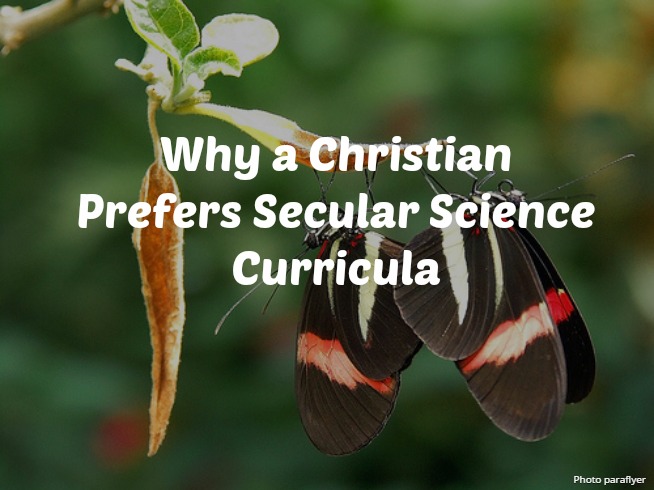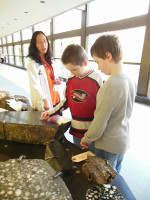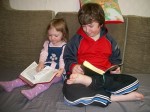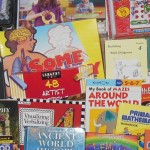Many years ago I made a deliberate choice to avoid science curriculum that was written for Christian homeschoolers. The whole issue between Young Earth Creationists and others in the homeschooling community has become quite political and polarizing. You have to be in the right group to be accepted in some circles. As I looked into Christian science curriculum I discovered this argument and polarization was present in the textbooks. Instead of a science text just being science, it was science mixed with reasons why another group was wrong. That was one main reason I avoided any Christian science curriculum. I want science to be science.
Another reason why I have neglected to use Christian science curriculum is that I want my child to have an unsheltered exposure and study of science so that tough questions can be faced while he is still under my wing. My son wanted to be a scientist even before he started school. Even his toddler interests were science-related. I would not be surprised if he did become a scientist. While he has many years left before he finishes high school, I want to take the time to carefully prepare him for a future in a science profession. One way I am preparing him is to give him a solid science education using secular materials.
Here is my current secular science sequence for my son who wants to be a scientist in either a biology or physics-related field:
Miller Levine Biology 6th
Physical, Earth, and Space Science: An Integrated Approach 4th-6th
Earth Science by Tarbuck 7th
Conceptual Physics 7th
Chemistry: A Molecular Approach by Tro 8th
Living in the Environment: Principles, Connections, and Solutions 9th
Zoology by Miller 9th
Chemistry: The Central Science by Brown 10th
Campbell Biology AP 11th
The Cosmos: Astronomy in the New Millennium 11th
Physics C –Physics, Volume 1 by Halliday, David, Resnick, Robert, Krane, Kenneth S. and Physics, Volume 2 by Resnick, Halliday, Krane 12th
As a Christian who holds Scripture to a high-standard I also realize there are many different interpretations out there. Personally, I’m not married to one specific interpretation of Genesis or the age of the earth. I want my child to consider science facts and ideas in the light of God’s Word. I don’t want him to approach science as something that is feared or new scientific discoveries as an attack on his faith. I want him to see that science and faith can coexist without dismissing science facts as wrong. For instance, we have discussed things like the Big Bang and how that sounds similar to “Let there be light.” in Genesis.
Next year my son will have his first full-fledged biology course. This is a secular textbook with a whole unit on evolution. He is also covering Earth Science in his CPO textbook. Should I state that we do lots of science in our homeschool? During the year he will also use Reasons to Believe’s Good Science, Good Faith curriculum as a good chunk of his Bible study time. This curriculum is from an old earth perspective and it teaches that science confirms the accuracy of the Bible with many of the materials and audio lectures presented by scientists who are Christians. While some may consider this a science curriculum, I would put this in the category of a Bible curriculum. Here is a brief summary:
Good Science, Good Faith Video Tour from Reasons Institute on Vimeo.
In addition to the Good Science, Good Faith curriculum my son will be reading the different perspectives on creation when he starts high school. I’ve put together this tentative list that covers the young earth, old earth, and theistic evolution perspectives. Because of my personal bias I’ve only selected authors that have a high regard for the accuracy of Scripture.
Beyond the Firmament: Understanding Science and the Theology of Creation
Coming to Peace with Science: Bridging the Worlds Between Faith and Biology
More Than a Theory: Revealing a Testable Model for Creation
Did Adam and Eve Really Exist?: Who They Were and Why You Should Care
The Cell’s Design: How Chemistry Reveals the Creator’s Artistry
The Young Earth: The Real History of the Earth – Past, Present, and Future
Bones of Contention: A Creationist Assessment of Human Fossils
I want him to think about the different perspectives and make up his own mind as he delves further and further into the world of science. While many may find science curriculum written for Christian homeschoolers to be sufficient or the way they want to approach the issue, I’ve come to the conclusion that an unsheltered exposure to science is the best way to teach my son.







great post, can i copy/paste to my brain, you said it so much more elegantly than i could. I’ve been a christian all my life, i don’t ever remember not loving Jesus but I’m also a trained/educated earth scientist. Many years ago a lady commented on a photo i took, i told here it was the result of a volcano 10,000 years ago. She promptly wrote back “i believe the young earth theory”. I didn’t know what that was exactly but i imagined. I was surprised this train of thought existed. So, if this is what Christians think of science i knew i would never use a christian science curriculum. If you do a brief study of the evolution of the earth and read Genesis 1 how can you not see a correlation. Gen 1 could be chapter headings. After reading the post and comments it’s nice to know i have so many kindred spirits out there.
I see your list starts at 4th grade. I’ll need 1st grade curricula next year. Any suggestions? He reads at 2nd grade level so maybe even a 3rd grade curricula would be ok.
Yes yes yes! We own literally all the 1st edition Apologia texts and we’re becoming disappointed and bored with them now that we’re veteran homeschoolers. I wish I had done things differently now.
While looking up various curricula for my daughter, I came across this post and found it very interesting. We’re Christians who very strongly believe that the Bible is true, but like you, I don’t see that the Bible specifically points to an age of the earth. I think many parts of the ‘secular’ evolution theory are flawed, but I also think that things like micro evolution are obviously occurring, and that doesn’t mean that God didn’t have a hand in that- quite the opposite, really. I was homeschooled and, probably unintentionally, kind of molded to distrust any person or book at the mention of evolution. I hope that my kids will be able to know many perspectives, ultimately believing the Bible and respecting science (and, more importantly, treat people kindly no matter what their view).
Love your post! What would you suggest for 3rd – 5th grade curriculum so my daughter will be ready for your suggestions in the later years? Thank you!
We did unit studies using library books for those grades.
Thank you for writing this article and sharing your references. I am glad for your emphasis on your high regard for the accuracy of Scripture. Much appreciated!
My son is science minded and a very logical thinker. We stress the difference between hard, observational science and theoretical historical science. I use a variety of sources for our study of science, so that he can become knowledgeable about all aspects. We focus on the scientific method and discuss different aspects of the debate. . . and interpretation of not only the biblical texts, but also interpretation of the evidence and data available. Confirmation bias is real and should be taken into account no matter what facet is being examined.
If it isn’t observational, hard, repeatable science, that I feel it can fall into the realm of apologetics, faith, current events, and debate. It is important that my son be able to be intellectually honest in his studies.
We do secular science as well. We’re Christian (Catholic, to be exact), and believe both ideas can co-exist. We certainly allow for the concept of a scientific evolution (with God as the great “designer” of it all), but hold sacred the idea of even if our “scientific” bodies evolved from animals, our souls make us “human” and they are completely God-made and God-given. I’ve struggled to find good secular homeschooling materials, so thank you for sharing your list — I will check into them.
I love this. I’m completely new to this homeschooling thing, but admittedly it was something I should have done long ago. I’m a teacher by trade and very familiar with secular science, and have always felt the conflict between it and Genesis beliefs- which is why I personally have adopted the “Old Earth” concept myself. I haven’t even begun to look at true Christian curricula because I had to pull my daughter out on emergency basis (it had gotten to the point that my husband and I refused to put up with another month and a half of the school she was in ) and for us Time4Learning was a quick and easy solution for her to finish out the year. Of course they use secular science, which for the remainder of this year she’s studying energy so it’s no big deal. I was wondering how to approach science going forward- so your post has helped me answer a few of those questions. Thank you!
I just found this post while searching for information about the Good Science, Good Faith course. Your approach is so similar to my own. I am trying to expose my son to logical arguments about a variety of topics, but I find that so many resources (both Christian and secular) use dogma, persuasion, or put-downs of people who believe differently rather than presenting a balanced and logical framework.
I would love to hear your thoughts on Good Science, Good Faith. I haven’t been able to find any reviews.
Stacey,
I didn’t actually use the Good Science, Good Faith curriculum. When I went to purchase it the costs of shipping (I live outside the USA) had gone up to put it out of my price range. I ended up making up my own study using many of the resources: http://eclectic-homeschool.com/science-and-the-bible/
Thank you for this post! This sounds like a great balanced approach. I’ve only just begun homeschooling, and one thing that I never thought of, was that Christian science textbooks even existed! We are using one now, and I’m not opposed to it, because it shows a different viewpoint than the textbooks at the public school, so I appreciate that there is an alternative, and that they bring God’s role into the realm of science. Anyway, I don’t hold hard and fast any specific theory, although I guess I might tend along the lines of Old Earth Creationist. I think ‘the jury is still out’. I also think MAYBE it could be a Young Earth. I’ve always felt uncomfortable with any text that says, this is the ONLY possibility. Anyway, I think it’s good for kids to know what theories are out there, just like you said, and think about them themselves, not just having one view or another exclusively presented to them as fact, because really, NO ONE knows what happened in the past! I do think the public school’s embracing of evolution as fact should be countered with other viewpoints, and that’s one of the great things about homeschooling-to be able to present multiple points of view. Thank you for your list of texts also, I’m so glad for this list because I really don’t know what to think myself, and I don’t know what is a good book or not. I feel like I’m unqualified to pick books in this realm! I do believe in the accuracy of Scripture, but I think there’s different interpretations. Maybe some of it is poetic language, not historical accounts, etc. I think the important part is that we acknowledge that God’s hand is in creation, it’s not random chance. But How God did it, we really just don’t know, and it’s important to be exposed to the various ideas, especially for kids who are likely to go into science (like my son).
Thanks Elaine. There is much we don’t know which is one reason why I want my son to be open minded about the Bible interpretation of how our world began.
I seriously felt like you took the words right out of my head in this post & the “Staying away from Christian science curriculum” post. My husband & I were wary of the quality of the Christian science curriculum/books we ran across, even though we chose a Christian curriculum. Our young elementary-aged son also loves science & has been talking about being a scientist for a long time now. I began to wonder if I was being too wary about my approach to Christian science curricula, but you said some things that confirmed my suspicions were not completely out-of-line! Honestly I was feeling a little lonely out here…thank you for the resources!
Thanks Rebecca! Glad to know I’m not alone too 🙂